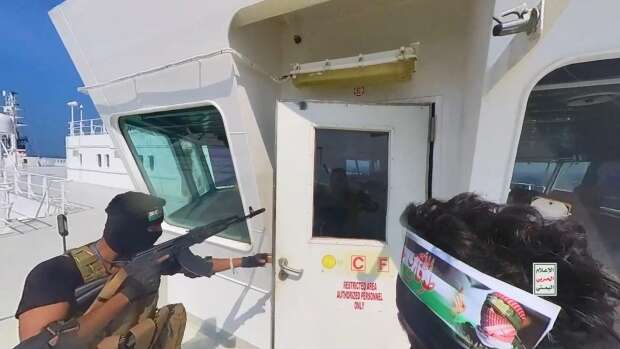Red Sea turmoil sends economic shockwaves far and wide
Two months of missile, drone and hijacking attacks against civilian ships in the Red Sea have caused the biggest diversion of international trade in decades, pushing up costs for shippers as far away as Asia and North America. The disruption is spreading, fueling fears of broader economic fallout.
Repeated rounds of retaliatory strikes by the US and its allies, as well as a multinational naval operation to patrol the waters, haven’t stopped the assaults by the Houthi militants that followed the start of the Israel-Hamas war. With sailors demanding double pay and insurance rates skyrocketing, shipping lines are steering clear of a waterway that normally carries 12% of the world’s seaborne trade.
More than 500 container ships that would have sailed through the Red Sea to and from the Suez Canal, carrying everything from clothing and toys to auto parts, are now adding two weeks to their routes to travel around the Cape of Good Hope at the southern tip of Africa, according to Flexport. That’s about a quarter of all the container-shipping capacity in the world, according to the digital logistics platform.
“We haven’t seen costs increase this quickly since the last crunch in the pandemic,” said Vincent Iacopella, a logistics expert at Alba Wheels Up. Many of the underlying bottlenecks in supply chains remain, even though prices dropped last year as the Covid-19 disruptions faded, he said. The cost of shipping containers from China to the Mediterranean Sea has more than quadrupled since late November, according to Freightos, a cargo-booking company.
Shipping lines, as well as those that carry oil, say they’re planning for the upheaval to last months or more, with vessels for the longer route booked as far out as the summer. That means every company sending goods has more inventory tied up in transit and needs yet more in case containers get scarce. Already, the factories that make those ubiquitous metal cargo boxes are working flat out, according to Container xChange, an online industry platform. Ports as far away as Halifax, Nova Scotia report delays in getting ships, and higher costs.
Customers are scrambling to adapt. Volvo Car AB and Tesla Inc. have announced production suspensions at plants in Europe, citing the inability to get components from suppliers in Asia. British retailers Tesco Plc and, Marks & Spencer Group Plc have flagged the risk of higher costs. Maersk, the No. 2 container carrier, warned last week that disruptions will last for a few months at least. Though many companies say they still haven’t felt the effects, the longer the upheaval goes on, the wider the economic impact.
Underestimated Risks
“So far, many executives and investors have consistently undershot the potential for this risk to emerge,” said Alexis Crow, who specializes in geopolitics and long-term investing at PricewaterhouseCoopers LLP. “This is perhaps predicated on a misguided assumption that the Israel-Hamas conflict remains contained.”
Though there’s no sign the higher costs are boosting inflation yet, central bankers are already warning of the risks. Christine Lagarde, president of the European Central Bank, cited “the coming back of supply bottlenecks” as one of the four key risk factors she’s watching. Low water levels are already slowing flows through the Panama Canal.
A spike in oil prices would be another risk for inflation if the conflict disrupted supply.
“So far I think we have been lucky in that we haven’t seen an oil tanker get hit.” said Saad Rahim, chief economist at Trafigura Group, one of the world’s biggest commodity traders. “That could be really something that then focuses the mind.”
Bloomberg Economics says the upside risks from shipping costs could offer central banks another reason to delay interest-rate cuts. Economists at JPMorgan Chase & Co forecast a 0.7 percentage-point increase to global goods inflation during the first half of this year if the shipping crunch persists.
Higher Costs
“So far, we’ve mainly felt the higher costs,” said Rainer Grill, spokesman for Ziehl-Abegg SE, a manufacturer of ventilation technology based in Kuenzelsau, Germany. “The delays are particularly painful for individual shipments — such as components for new production plants that are on their way to Asia.”
Niels Rasmussen, chief shipping analyst at trade group Bimco, said the impact from the Red Sea crisis is already more severe than that from the Ever Given, the huge ship which ran aground and blocked the Suez Canal for about a week in 2021. If it continues, he said, the effect could rival the 1956 Suez Crisis, which left the canal closed for five months.
This time, Bloomberg Intelligence estimates the rerouting adds about 40% in voyage distance. For importers that means delays, higher costs, key components stuck on the high seas and air freight offering a limited alternative. The volume of shipments by plane from Vietnam to Europe — a major route for clothing — jumped 62% in the week ended Jan. 14, according to Oslo-based Xeneta. Other carriers are going overland via Kazakhstan, bypassing Russia to get goods to Europe.
US Casualties
On the turquoise waters off Yemen, there are signs the tensions may be getting worse.
On Tuesday, the Pentagon said the US and its allies had destroyed 25 Houthi missile facilities, days after President Joe Biden warned that strikes would continue for the foreseeable future.
“Deterrence is not a light switch,” US Deputy National Security Adviser Jon Finer told ABC on Sunday. “We are taking out these stockpiles so they will not be able to conduct so many attacks over time. That will take time to play out.”
Late Sunday, the US reported the first two deaths of soldiers involved in the operation. A pair of Navy SEAL commandos died during a night mission to board a dhow — a local boat frequently used by the Houthis to ferry supplies from their main backer, Iran.
The group’s assaults began a few weeks after Hamas’ deadly Oct. 7 attack on Israel. So far, the Houthis haven’t done much damage, but shipping companies are spooked nonetheless.
Most of the Houthi attacks have come in and around the Bab el-Mandeb — which translates roughly from Arabic as ‘Gate of Tears’ — a narrow strait that vessels pass through to enter the Red Sea coming from the Indian Ocean.
The global attention is something the Houthis, a militant group from the remote mountains of Yemen, have been craving for years. The car-transport ship they hijacked in their first attack is now docked off the country’s coast, an attraction for local residents.
If it weren’t for the actions of the US and its allies, “we would not have become a regional and international force,” Mohammed al-Bukhaiti, a member of the Houthi Political Council, said in a phone interview from Sanaa. He vowed that the attacks will continue as long as Israel’s assault on Gaza and blockade of the enclave do. “We are confident that we will win regardless of how much they mobilize forces,” he said.
Iran Role
Iran counts the group along with Hamas in Gaza and Hezbollah in Lebanon in its “axis of resistance.” The Houthis’ arsenal includes ballistic and cruise missiles, some inherited from the Soviet-era stocks they captured in the civil war, upgraded with Iranian technology, according to military analysts.
“Iran trusts the Houthis a lot,” said Adnan Al-Gabarni, a Yemeni specialist on the militant group. Tehran provides support but “leaves a margin for the Houthis to act on their own.”
Supplies of oil and gas so far haven’t been affected dramatically.
The Red Sea route has become a key corridor for Russian oil cargoes in the wake of Europe’s decision to stop buying from Moscow over its invasion of Ukraine. The Houthis have said they won’t target those ships, though two have been struck, apparently by accident. Some other producers are also using the route, hoping to avoid the Houthis’ wrath. Most Middle East crude bound for the US Gulf Coast already goes around the Cape of Good Hope because it’s carried in tankers too big to fit through the Suez Canal when fully loaded.
China has so far steered clear of the Red Sea conflict. The world’s biggest trading nation imports about half of its crude oil from the Middle East, and it exports more to the European Union than the US. The Houthis have said they won’t target Chinese ships.
By exposing the vulnerabilities in the global supply chain that remain since the pandemic, the Red Sea stress has highlighted risks for other potential hot spots, as well, cautioned Josh Lipsky, senior director of the GeoEconomics Center at the Atlantic Council in Washington.
“If anyone expected two years later we’d be able to look at a shut down in the Red Sea and say, ‘that’s fine because we’ve built up these resiliencies closer to home’ — that’s just not realistic,” he said.








